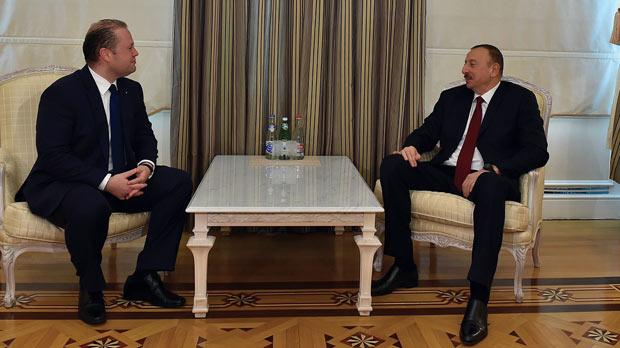Anti-corruption organisation Global Witness raised significant concerns about the major deficiencies in the tendering process of Azerbaijani’s state-owned oil company SOCAR and its opacity, according to a report by Transparency International UK.
The NGO pointed out that this has left the country’s natural resources exposed to “embezzlement and rigged procurement”, anti-corruption organisation Transparency International UK said in a report on UK MPs who appeared to have engaged in activities that appeared to support or legitimise the actions of a corrupt regime in Azerbaijan.
SOCAR – the Azerbaijani State Oil Company – has an 18 year exclusivity agreement worth $1 billion (€856m) to supply to Malta’s new power station with LNG.
It purchases LNG from Shell and then sells it to Electrogas, the consortium operating the new power station, which in turn sells it to Enemalta.
In April, The Guardian reported that Enemalta paid Electrogas at least €131.6 million for gas in 2017, nearly twice the open market rate. SOCAR sold Electrogas Malta the same amount of gas and charged an estimated $153m (€131m), keeping $40 million (€34.2m).
In March 2017, Azerbaijan was suspended by the Extractives Industry Transparency Initiative (EITI) – the global standard for natural resource good governance – because of its failure to allow civil society oversight of its energy industry. The next day it withdrew from the initiative altogether – soon after Global Witness expressed its concern, Transparency International UK said.
The report also highlighted how these activities provided “a veneer of respectability to foreign regimes that stymie freedom of expression, ride roughshod over the rule of law and abuse their positions of power for personal enrichment”.
In recent years, there was “a concerted attempt by the regime to portray itself as a modern and respectable part of the international community,” through hosting of a series of international cultural events such as the European Games, the Baku Formula 1 Grand Prix and the Eurovision Song Contest.
Malta’s relationship with Azerbaijan has been highlighted in a 2017 report drawn up by Freedom Files – an NGO that conducts research on human rights and democracy problems in authoritarian countries – which said “Malta is considered by Azerbaijani oligarchs as one of the ‘provinces’ of Azerbaijan.”
In 2014, there was an unannounced visit by Prime Minister Joseph Muscat, his chief of staff Keith Schembri, his communications coordinator Kurt Farrugia and then energy minister Konrad Mizzi to Azerbaijan where they met President Aliyev.
Read more: Electrogas ‘reveals’ volume of LNG supply from SOCAR
The Freedom Files report also pinpoints Malta as one of the key locations where corrupt Azerbaijani officials keep their money. Several members of the ruling elite of Azerbaijan held accounts in Pilatus Bank whose owner Ali Sadr Hasheminejad, has since been apprehended in the US and is facing charges that carry a penalty of up to 125 years imprisonment.
The report had highlighted how Speaker Anglu Farrugia observed many elections in Azerbaijan and always spoke positively about them, ignoring electoral fraud and gross human rights violations. It also described as “good timing”, the way Farrugia was monitoring 2013 elections a few days before ElectroGas consortium, which includes SOCAR, won a bid to supply Malta with natural gas.
The UK report also mentioned the bribery scandal at the Parliamentary Assembly of the Council of Europe (PACE) where 13 members were expelled for having accepting gifts from the Azerbaijani government following an independent investigation.
The payments were allegedly to secure enough support from PACE delegates to vote down a report critical of the country’s human rights record.
Maltese former MP Joe Debono Grech, who served as PACE co-rapporteur for Azerbaijan for several years, had been exonerated by the inquiry after no evidence was found linking him to corrupt or inappropriate activity, despite his pro-Azeri stance and “alleged lack of initiative.”
One of the UK’s delegates, MP Robert Walter MP, was found to have failed to declare or resolve conflicts of interest that could have prejudiced his opinions while being a rapporteur and head of a PACE mission to observe the country’s 2013 presidential election.
Another UK MP Mike Hancock was singled-out as an ‘apologist’ for the regime by the European Stability Initiative (ESI) as he allegedly defended the integrity of Azerbaijan’s 2008 and 2010 elections in the face of criticism from international observation missions and opposed a key report critical of the country’s record on human rights.
In 2010, both Hancock’s local constituency party and party received a total of £11,500 in cash donations from The European Azerbaijan Society (TEAS) – Azerbaijan’s lobbying organisation for Europe, including the UK. TEAS founder and chairman is Tale Heydarov, the son of the country’s Minister of Emergency Affairs.
In their recommendations, Transparency International UK called for Parliament’s Commissioners for Standards to launch a joint inquiry into the behaviour of MPs and Peers and their role – either unwittingly or complicitly – in legitimating corrupt and repressive regimes. This should include both a review of Parliament’s Codes of Conduct and the way these are enforced.
It also called for easier access to the financial details and interests of the members of both Houses of Parliament.













